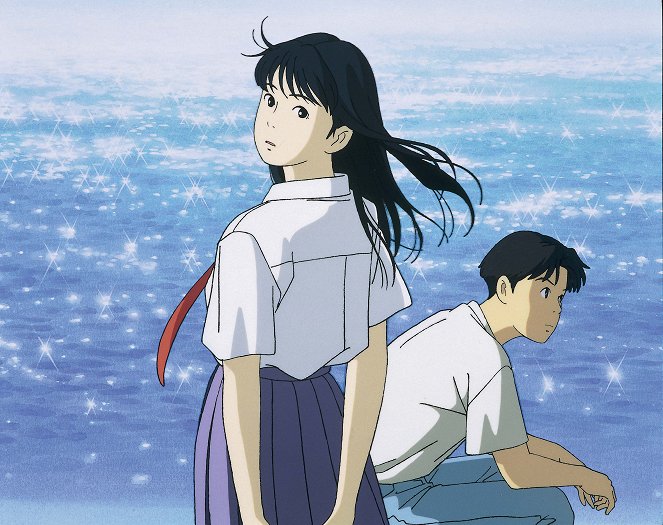Réalisation:
Tomomi MochizukiScénario:
Keiko NiwaPhotographie:
Atsushi OkuiMusique:
Shigeru NagataActeurs·trices:
Toshihiko Seki, Tomokazu Seki, 久川綾, Hikaru Midorikawa, Yuri Amano, Nobuo Tobita, Kae Araki, Reiko Suzuki, Kinryū Arimoto, Jun'ichi Kanemaru, Ai Satō (plus)Résumés(1)
Taku Morisaki, a Tokyo college student from a small town on the island of Shikoku, catches a glimpse of a familiar figure on the opposite train platform. Surely it’s Rikako Muto. But didn't she go to a university in Kochi? Taku's memories carry him back to that summer day two years ago when he first met Rikako. Not only was she beautiful, she was at the top of her class in class and on the sports field. To his surprise, Taku was not happy when his best friend Matsuno became attracted to Rikako. She should have only been the subject of his friend's crush and nothing more to him. That is, until the school trip to Hawaii in their senior year… (Wild Bunch Distribution)
(plus)Critiques (1)
The problem with Ocean Waves (Umi ga kikoeru) is viewer expectations, which are primarily associated with the fact that it is a production from Studio Ghibli, but may also be based on what we have become accustomed to in the area of anime. This project is fundamentally and intentionally different from what we would expect in either case. Ocean Waves was initiated directly as a platform for young filmmakers from the studio’s ranks and as a departure from the projects of the then already old masters Miyazaki and Takahata. As a first attempt, it also had to be a deliberately inexpensive production that wouldn’t be released in cinemas, but on television as a one-hour special. Instead of Miyazaki’s fantastical worlds, this work of young filmmakers is supposed to be conceptually closer to Takahata’s simpler films. Unlike those, however, Ocean Waves lacks magical realism and the low-key celebration of the minor details of everyday life depicted with obsessive emphasis on perfectly capturing them in the form of animation. Ocean Waves is an adaptation of the book of the same name, which nostalgically turns to the time of adolescence and deals with a platonic triangle of two friends at a provincial high school and a newly arrived co-ed from Tokyo. In line with the book, however, the film’s depiction of the relationships is a radical departure from the typical affected hyper-stylisation and formulaic nature of mainstream anime. Instead of grand emotions, flashy chaos and condensed relationship clichés, Ocean Waves works with the motifs of shyness in expressing one’s feelings and the general insipidness of adolescence in the ordinariness of those feelings spread out over time. This is further enhanced by the fragile narrative, which presents all of the events not with an omniscient view, but from the perspective of one of the protagonists. The limitations of having a single perspective conditions the seemingly meaningless and undramatic peripeteias, the ambiguous clues and the uncertainties, which are usually not lacerating and intense, but merely authentically confusing. Ocean Waves is thus one of the simplest and unobtrusively fragile films about teen love, but because of that, viewers may find it to be rather inaccessible.
()
Photos (11)
Photo © Wild Bunch Distribution

